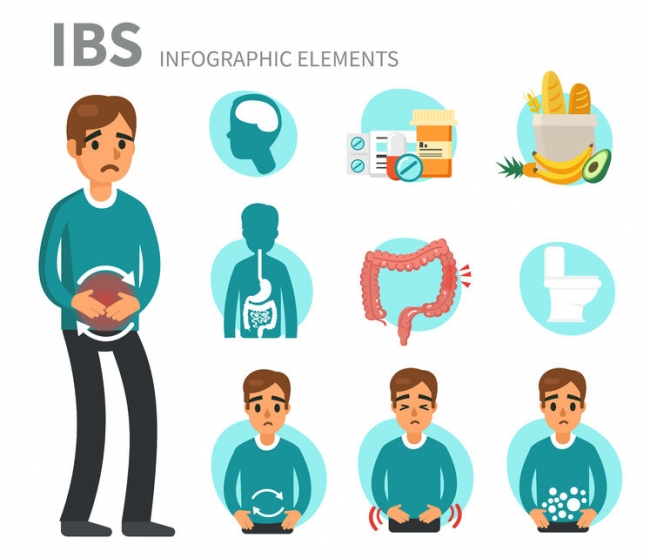Irritable Bowel Syndrome (IBS) Treatment in Ireland
Search and Compare the Best Clinics and Doctors at the Lowest Prices for Irritable Bowel Syndrome (IBS) Treatment in Ireland

Find the best clinics for Irritable Bowel Syndrome (IBS) Treatment in Ireland
No clinics available
United Arab Emirates offers the best prices Worldwide
Price: $ 228

- Home
- Ireland
WHY US?
At Medijump, we're making medical easy. You can search, compare, discuss, and book your medical all in one place. We open the door to the best medical providers worldwide, saving you time and energy along the way, and it's all for FREE, no hidden fees, and no price markups guaranteed. So what are you waiting for?

Free

Best Price

Widest Selection

Risk-Free
What you need to know about Irritable Bowel Syndrome (IBS) Treatment in Ireland

Irritable bowel syndrome (IBS) is a gastrointestinal problem causing long term and persistent discomfort that affects 10% to 20% of the population. It is rarely complicated and it is not life-threatening, however, it can change the way you live your life, interfere with your ability to take part in daily activities, and make you miss work more often. While some people may be able to control their symptoms by managing stress and making lifestyle and diet changes, others may need treatment that will let them live as normally as possible.
What Does the Procedure Involve?
Your doctor will perform some tests to rule out other diseases and determine which IBS type you have, whether it is constipation-predominant, diarrhea-predominant, or mixed. Then, after confirming their diagnosis, your doctor may prescribe medications, such as Alosetron to relax your colon and slow the movement of waste through the lower bowel, Eluxadoline to ease diarrhea by reducing fluid secretion and muscle contractions in the rectum, Rifaximin to decrease bacterial growth, and Lubiprostone or Linaclotide to increase fluid secretion in your small intestine and help you pass stool.
How Long Should I Stay in Ireland for a Irritable Bowel Syndrome (IBS) Treatment Procedure?
You should be able to leave Ireland right away if you do not experience any symptoms. However, it is best to consult with your doctor the ideal time for you to travel home as they may schedule a follow-up appointment to see how you are responding to the medications.
What's the Recovery Time for Irritable Bowel Syndrome (IBS) Treatment Procedures in Ireland?
Unless you are experiencing symptoms that interfere with your ability to perform daily activities, you usually do not need any downtime after IBS treatment.
What sort of Aftercare is Required for Irritable Bowel Syndrome (IBS) Treatment Procedures in Ireland?
After the treatment, you should not forget to take the medication that was prescribed. Your doctor may also advise you to talk to a dietitian to help you make diet changes and create the best diet plan for you. It is really important to eliminate high-gas food and gluten from your diet. Besides changing your diet, make sure to exercise regularly to stimulate normal contractions of your intestines and help you to feel better.
What's the Success Rate of Irritable Bowel Syndrome (IBS) Treatment Procedures in Ireland?
Treatment for irritable bowel syndrome is generally safe and effective as long as used as prescribed. The side effects and risks of the medications are nausea, diarrhea, and belly pain. In some cases, the medication may not be successful to improve symptoms.
Are there Alternatives to Irritable Bowel Syndrome (IBS) Treatment Procedures in Ireland?
If you do not want to take medicine because you are not an ideal candidate for it or due to your own personal preference, you can undergo hypnosis, mindfulness training, acupuncture, or take probiotics. Always make sure to talk to your doctor before you start any of these alternatives.
What Should You Expect Before and After the Procedure
Irritable bowel syndrome can seriously disturb your day-to-day activities, preventing you from enjoying the activities you love. After treatment, the symptoms should be gone and you can live a normal life.
Whilst the information presented here has been accurately sourced and verified by a medical professional for its accuracy, it is still advised to consult with your doctor before pursuing a medical treatment at one of the listed medical providers
No Time?
Tell us what you're looking for and we'll reachout to the top clinics all at once
Enquire Now

Popular Procedures in Ireland
Prices Start From $131

Prices Start From $47

Recommended Medical Centers in Ireland for procedures similar to Irritable Bowel Syndrome (IBS) Treatment

- Interpreter services
- Translation service
- Religious facilities
- Medical records transfer
- Medical travel insurance
- Health insurance coordination
- TV in the room
- Safe in the room
- Phone in the room
- Private rooms for patients available

- Interpreter services
- Translation service
- Religious facilities
- Medical records transfer
- Medical travel insurance
- Health insurance coordination
- TV in the room
- Safe in the room
- Phone in the room
- Private rooms for patients available

- Interpreter services
- Translation service
- Religious facilities
- Medical records transfer
- Medical travel insurance
- Health insurance coordination
- TV in the room
- Safe in the room
- Phone in the room
- Private rooms for patients available

- Interpreter services
- Translation service
- Religious facilities
- Medical records transfer
- Medical travel insurance
- Health insurance coordination
- TV in the room
- Safe in the room
- Phone in the room
- Private rooms for patients available

- Interpreter services
- Translation service
- Religious facilities
- Medical records transfer
- Medical travel insurance
- Health insurance coordination
- TV in the room
- Safe in the room
- Phone in the room
- Private rooms for patients available

- Interpreter services
- Translation service
- Religious facilities
- Medical records transfer
- Medical travel insurance
- Health insurance coordination
- TV in the room
- Safe in the room
- Phone in the room
- Private rooms for patients available

- Interpreter services
- Translation service
- Religious facilities
- Medical records transfer
- Medical travel insurance
- Health insurance coordination
- TV in the room
- Safe in the room
- Phone in the room
- Private rooms for patients available

- Interpreter services
- Translation service
- Religious facilities
- Medical records transfer
- Medical travel insurance
- Health insurance coordination
- TV in the room
- Safe in the room
- Phone in the room
- Private rooms for patients available

- Interpreter services
- Translation service
- Religious facilities
- Medical records transfer
- Medical travel insurance
- Health insurance coordination
- TV in the room
- Safe in the room
- Phone in the room
- Private rooms for patients available

- Interpreter services
- Translation service
- Religious facilities
- Medical records transfer
- Medical travel insurance
- Health insurance coordination
- TV in the room
- Safe in the room
- Phone in the room
- Private rooms for patients available
Irritable Bowel Syndrome (IBS) Treatment in and around Ireland
Introduction
Ireland, also known as the Republic of Ireland, is a country located in north-western Europe that occupies 26 of 32 counties on the island of Ireland. The country’s breath-taking landscape, wonderful people, and fascinating history have made it an unforgettable destination for many visitors. Aside from its beauty, more and more people also come to Ireland for high-quality healthcare. The country is a newcomer to the medical tourism market. However, it’s seen as an increasingly attractive destination due to the reasonably priced and high standard of clinical care available in the country. Most foreign patients come for cosmetic surgery and dental treatments, but many hospitals and clinics in the country offer a wide variety of services, such as cardiology, pathology, pulmonary, and gynecology. Also, the Joint Commission International has accredited several hospitals in the country, most of which are located in Dublin.
Popular Cities and Regions in Ireland
Ireland’s capital and largest city, Dublin, is the most popular tourist destination within the country. In fact, it’s the fourth most visited European capital. It’s filled with excellent pubs serving the perfect pint of Guinness, amazing Georgian architecture, and layers of fascinating history. Tourists in this city usually visit the Guinness Storehouse Factory, tour the Old Jameson Distillery, admire the Spire of Dublin, explore Dublin Castle, and marvel at the beauty of St. Patrick’s Cathedral. Another famous city is Cork, which is the second-largest city in the country. It’s a youthful cosmopolitan city packed with artisan coffee bars and snug pubs. Tourists usually come to kiss the Blarney Stone for good luck, enjoy the coastal landscape in Mizen Head, or hike around Gougane Barra. Other popular cities and towns include Galway, Killarney, Kilkenny, and Letterkenny.
Transport in Ireland
The main airport in Ireland is Dublin Airport. It connects the country with numerous cities around the world, including New York, Abu Dhabi, and Hong Kong. Trains and buses are available to travel around the country. However, public transportation is generally sparse in rural areas. Therefore, renting a car is the best mode of transport. Taxis and Uber are available to travel inside major cities.
Visas in Ireland
Ireland has opted out of the Schengen Area. The country allows all EU citizens, as well as citizens of 56 other countries (such as the UAE and the US), to stay without a visa for up to 90 days. Citizens of other countries are required to apply for a visa in advance.
Weather in Ireland
Summer (June – September) provides plenty of sunshine and lower levels of rainfall, with an average temperature of 14°C - 16°C. Winter (October – February) is chilly, with ample rainfall and some snow. Spring and autumn are generally pleasant, with warmer temperatures and more sunshine.
Additional Info
- Local Currency: The official currency is the euro. 1 EUR is approx. 1.08 USD.
- Money & Payments: ATMs are easy to find. Credit and debit cards are widely accepted. Tipping is expected in some places, typically 10% for decent service.
- Local Language: There are several languages used in Ireland. English has been the predominant first language since the late 18th century, but Irish is still widely used by a small percentage of the population.
- Local Culture and Religion: The constitution of Ireland guarantees freedom of religion. Christianity is the largest religion. However, Islam, Hinduism, Judaism, Buddhism, Neo-Paganism, and other religions are present.
- Public Holidays: Some of the most celebrated public holidays are New Year’s Day, St. Patrick’s Day, Easter Monday, Christmas Day, and St. Stephen’s Day.
Popular Searches
- Plastic Surgery in Thailand
- Dental Implants in Thailand
- Hair Transplant in Thailand
- Breast Augmentation Thailand
- Gastric Sleeve in Thailand
- Gender Reassignment Surgery in Thailand
- Laser Hair Removal in Bangkok
- Botox in Bangkok
- Dermatology in Bangkok
- Breast Augmentation in Bangkok
- Coolsculpting in Bangkok
- Veneers in Turkey
- Hair Transplant in Turkey
- Rhinoplasty in Turkey
- Stem Cell Therapy in Mexico
- Rhinoplasty in Mexico
- Liposuction in Mexico
- Coolsculpting in Tijuana
- Rhinoplasty in Korea
- Scar Removal in Korea
- Gastric Sleeve in Turkey
- Bone Marrow Transplant in India
- Invisalign in Malaysia
- Plastic Surgery in the Dominican Republic
- Tummy Tuck in the Dominican Republic
- Plastic and Cosmetic Surgery in Poland
- Rhinoplasty in Poland
- Hair Implant in Poland
- Dental Implants in Poland
- IVF in Turkey